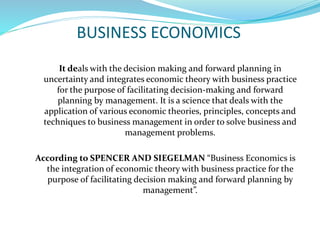Key Challenges Facing Business and Economics in the Post-Pandemic Era
Key Challenges Facing Business and Economics in the Post-Pandemic Era
Blog Article
Organization and Business Economics 101: Vital Knowledge for Striving Leaders
In today's rapidly advancing service landscape, aiming leaders must grow an extensive understanding of essential critical structures and economic principles. Mastering ideas such as supply and need, market frameworks, and competitors is not just scholastic; these aspects are essential fit reliable decision-making and cultivating advancement. Additionally, economic proficiency-- especially in cash money flow management-- acts as a cornerstone for sustainable growth. As we explore these important topics, it comes to be noticeable that the crossway of company acumen and financial understanding is essential for future leaders to not only survive yet prosper in their endeavors. What ramifications does this have for calculated leadership?
Comprehending Supply and Need
Supply and need are essential principles that constantly underpin the technicians of any type of market economic climate. The connection in between these two forces identifies the rate of products and solutions as well as their schedule in the market. Supply refers to the amount of an item that manufacturers are able and willing to cost numerous cost degrees, while demand shows the quantity that customers agree and able to purchase.
When demand increases without a matching increase in supply, rates tend to climb, signaling manufacturers to enhance result. On the other hand, if supply overtakes need, prices may fall, prompting producers to minimize outcome. This dynamic interplay aids to attain market stability, where the amount provided matches the quantity demanded at a certain cost point.

Exploring Market Structures
Market frameworks define the competitive environment in which organizations operate, dramatically influencing their pricing methods, output levels, and total earnings. Recognizing these frameworks is important for aiming leaders, as they shape business decisions and market characteristics.
There are four main kinds of market frameworks: excellent competition, monopolistic competition, oligopoly, and syndicate. In a perfectly affordable market, various firms use identical items, leading to price-taking habits. Monopolistic competitors attributes many firms marketing distinguished items, permitting some prices power. Oligopolies contain a couple of leading companies that can affect market value, commonly bring about tactical interactions and affordable actions. Syndicates exist when a solitary company regulates the market, resulting in the highest level of pricing power and potential market ineffectiveness.
Each market framework provides special obstacles and possibilities for services. Leaders need to recognize these subtleties to efficiently position their organizations, establish competitive strategies, and react to market changes. By realizing the effects of numerous market structures, aspiring leaders can make educated decisions that drive their businesses towards sustainable success and growth in an ever-evolving financial landscape.
Financial Principles for Leaders
Effective management in organization requires a strong understanding of monetary principles, as they underpin strategic decision-making and source allowance. Leaders need to realize crucial concepts such as cash money flow administration, earnings analysis, and economic forecasting. These components are vital in examining an organization's economic health and leading its future instructions.
Cash money flow monitoring is particularly essential; it guarantees that the organization keeps sufficient liquidity to fulfill its obligations while seeking development opportunities. Examining profitability enables leaders to identify which solutions or products yield the greatest returns, making it possible for educated financial investment decisions. Additionally, monetary projecting helps expect future profits and expenses, promoting more precise budgeting and source allotment.
Moreover, comprehending monetary declarations-- such as balance sheets, revenue statements, and capital statements-- gears up leaders with the insights essential to make educated choices. This expertise cultivates accountability and transparency, improving stakeholder trust.
In today's vibrant organization environment, leaders must be proficient at translating economic information to react swiftly to market changes. Inevitably, a solid grasp of monetary principles equips leaders to drive their companies toward lasting success while efficiently managing dangers and sources.
The Role of Competition
Comprehending the duty of competition is essential for any type of business intending to grow in a saturated market. Competitors drives innovation and efficiency, compelling companies to enhance their product or services consistently. In a competitive landscape, firms have to separate themselves try here to bring in and keep customers. This differentiation can show up through exceptional quality, unique functions, or outstanding customer care.
Furthermore, competitors can cause far better prices techniques. As companies try market share, they are incentivized to offer competitive rates, benefiting customers while difficult businesses to handle expenses properly. This dynamic fosters a society of consistent enhancement, pushing companies to improve procedures and enhance worth propositions.
Furthermore, competitors can stimulate market development by urging brand-new participants. New companies often introduce fresh ideas and strategies, even more boosting the overall market landscape. Companies should likewise be vigilant; too much competition can lead to market saturation, lowering profitability for all players hop over to here included.
Inevitably, understanding and navigating competition is critical for leaders. By recognizing its multifaceted function, aspiring leaders can make informed decisions that position their organizations for long-lasting success in an ever-evolving marketplace.
Strategic Decision-Making
In the realm of service, calculated decision-making is basic to adapting and achieving long-lasting goals to altering situations. This procedure includes assessing different alternatives and selecting the most efficient strategy that straightens with the company's vision and objectives. Efficient calculated decision-making needs a comprehensive understanding of both outside and inner settings, including market fads, competitive dynamics, and organizational capabilities.
Leaders must gather appropriate info, assess it seriously, and forecast potential end results. Furthermore, assessing dangers associated with each alternate enables leaders to prepare for challenges and create backup plans.
Ultimately, successful calculated decision-making empowers companies to navigate complexities, utilize opportunities, and respond proactively to risks. By growing a society that values informed decision-making, organizations position themselves to introduce and maintain an one-upmanship in an ever-evolving organization landscape. Aspiring leaders should sharpen these skills, as their capability to make sound calculated choices will significantly affect their companies' success and sustainability.

Final Thought
Recognizing the duty of competitors additional enhances critical thinking, enabling leaders to browse intricate market characteristics. Ultimately, this fundamental expertise furnishes future leaders to introduce and straighten business strategies with progressing market conditions, leading the method for sustained success and success.
Recognizing these concepts is crucial for aspiring business leaders, as they develop the structure for effective decision-making in pricing, source allocation, and market approach. Comprehending supply and need equips leaders to navigate the complexities of market variations and customer actions.
Syndicates exist when a single company regulates the market, resulting in the greatest level of rates power and possible market ineffectiveness.
By understanding the implications of different market frameworks, striving leaders can make enlightened decisions that drive their services toward lasting success and growth in an ever-evolving financial landscape.
Recognizing the duty of competitors additional boosts critical thinking, making it possible for leaders to check browse complicated market dynamics.
Report this page